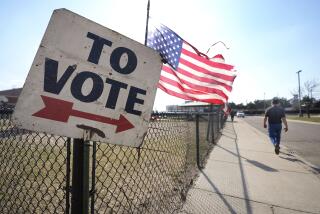What if Mitt Romney didn’t actually win the Iowa caucuses?
One of the great things about the Iowa caucuses is the event’s quirky Hey, kids, let’s put on a show quality.
Candidates do indeed still shag voter questions in intimate settings, addressing audiences of a dozen or fewer after navigating to the front around tables laden with home-baked cookies and Jell-O salad. (At least that’s the case for minor candidates before they become major; see Santorum, Rick.)
But the downside of what amounts to an amateur production surfaced in the last 24 hours with reports calling into question Mitt Romney’s astonishingly thin eight-vote victory Tuesday night.
On Thursday, Edward True of Moulton, Iowa, filed an affidavit saying that Romney’s reported total in the caucus he attended overstated his support by 20 votes, the Daily Iowegian reported.
If what True said is true, Romney’s victory would become a 12-point Santorum win. Unless, of course, there are further adjustments in the tabulation the Iowa Republican Party plans to make over the next two weeks as part of its official certification process.
That probably wouldn’t materially affect the nature of the GOP race. Even if Romney had finished a close second, he still would have walked away a winner on Tuesday by crippling his most serious potential rivals, former House Speaker Newt Gingrich and Texas Gov. Rick Perry, and avoiding the spanking that other national front-runners have gotten in Iowa.
But it might have changed the story line a bit starting Wednesday morning, and those sorts of narratives matter; consider the advantage George W. Bush gained during the 2000 recount with the perception--fed by an Al Gore concession the Democrat quickly retracted--that he had won the race and Gore was trying to steal the White House.
Again, whatever happens two weeks from now in Iowa is not likely to fundamentally reshape what looks, at this point, to be a three-way fight for the GOP nomination between former Massachusetts Gov. Romney, former Pennsylvania Sen. Rick Santorum and Texas Rep. Ron Paul, with Romney in command.
Santorum, for one, minimized the significance of the ultimate Iowa outcome.
“There will be, without question given the lateness of the hour and the hecticness that comes with turning in these numbers, there will be changes,” Santorum said on Fox News Channel. “That doesn’t really matter to me. This was a tie.”
The Romney camp chose to stay quiet and, at least publicly, leave well enough alone. Privately, they acknowledged there was no point in stirring things up.
The question is whether the incident will undermine Iowa and its claim on the first voting slot on the calendar, which politicos in most other states are only too eager to criticize.
In a statement released late Thursday night, Iowa GOP Chairman Matt Strawn said during the party’s certification process, it “will not respond to every rumor, innuendo or allegation,” out of respect for the candidates.
“That said, Iowa GOP officials have been in contact with Appanoose County Republican officials tonight and do not have any reason to believe the final, certified results of Appanoose County will change the outcome of Tuesday’s vote,” Strawn said.
As a privately run affair--as opposed to a state-conducted election--the caucuses amount to a popularity contest among those who choose to attend. In some cases, voting was as informal as writing a name on a scrap of paper and passing it down the aisle.
No delegates were at stake, so there is no official provision for a recount. No state or taxpayer money was involved, so the entire operation--in nearly 1,800 precincts across Iowa--was run out of the goodness of volunteer hearts.
“It speaks to how hard everyone has been working,” said Nicole Sizemore, a spokeswoman for the state GOP. “You have people who don’t do this on a daily basis, but out of their passion, so they’re trying as best they can.”
“I don’t think this hiccup... discredits Iowa to any extent,” she added.
Dennis Goldford, a Drake University political scientist and longtime caucus-watcher, agreed. “It’s not as though we elected somebody to political office and now have to kick them out and put someone else in and change the curtains,” said Goldford. “It’s an embarrassment, perhaps, but one without significance.”
The next nominating contest, Tuesday’s New Hampshire primary, is a state-run election that includes safeguards to ensure an accurate count, not least the state’s famously punctilious Secretary of State Bill Gardner.
mark.barabak@latimes.com
More to Read
Get the L.A. Times Politics newsletter
Deeply reported insights into legislation, politics and policy from Sacramento, Washington and beyond. In your inbox three times per week.
You may occasionally receive promotional content from the Los Angeles Times.







